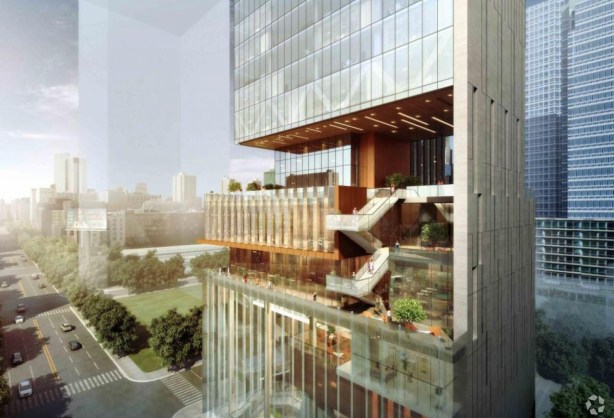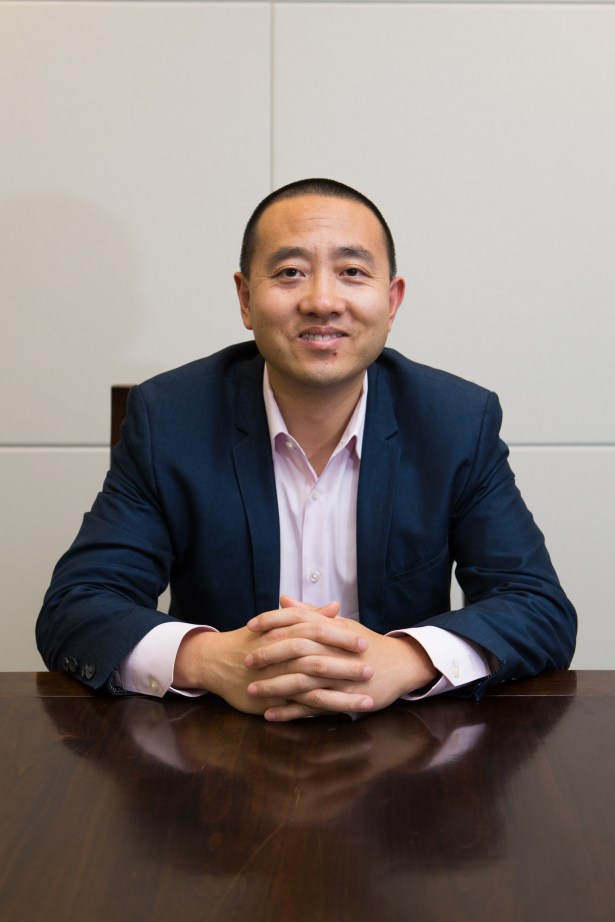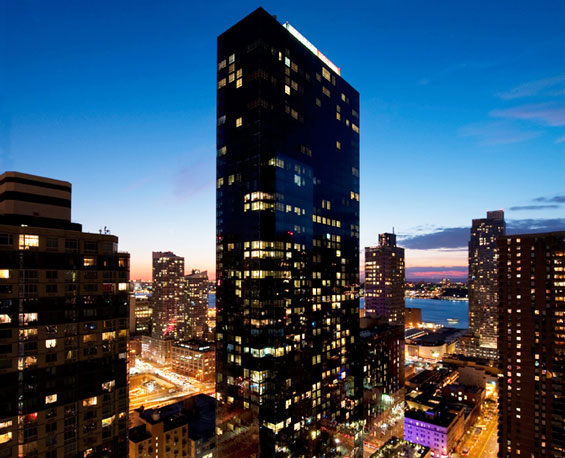Kuafu Properties’ Shang Dai Begins to Shift His Game Plan
By Danielle Balbi August 5, 2015 8:00 am
reprints
While recent headlines have given the impression that New York is being bought up by China, the appeal of Manhattan real estate, for many Chinese investors, runs deeper than acquiring trophy properties like the Waldorf Astoria or One Chase Plaza.
The flexibility that comes with buying real estate in New York and other major U.S. cities allows those investors to focus less on snapping up iconic hotels and office buildings, and instead to build their own brands from the ground up.
“To our belief, we think this is a starting point,” Shang Dai, chief executive officer of development firm Kuafu Properties and founder of law firm Dai & Associates, told Commercial Observer in a series of interviews in July. “More and more Chinese people and Chinese capital will explore the world, and the U.S. is the first stop to consider,” he said.
Mr. Dai and his partner Zengliang (Denis) Shan, founder of China’s largest architecture firm, founded Kuafu Properties in 2013 when the two paired up to tackle a development opportunity in Hudson Yards—the Hudson Rise hotel and condominium tower at 470 Eleventh Avenue.

The lawyer and architect duo have since taken on three other luxury condominium projects throughout Manhattan: a large development at East 86th Street and Lexington Avenue, a mixed-use tower at 1289 Lexington Avenue; 1 MiMA Tower at 460 West 42nd Street; and most recently, another mixed-use development on East 60th Street between Third and Lexington Avenues.
Kuafu Properties, located on the twenty-second floor of a simple, sleek office building at 1500 Broadway, sits directly above New York City’s tourist capital, Times Square—in many ways mirroring the firm’s role as an intermediary of foreign capital flowing into the U.S.
Fittingly, the young development firm has worked with and been in talks with some of the largest Chinese debt and equity providers including Bank of China, Industrial and Commercial Bank of China and JD Capital, Mr. Dai said. He noted that their investor base is an even split between Chinese institutional investors, established Chinese developers and high-net-worth individuals.
While the firm’s four to-be-completed projects all feature a luxury condo component, news of the two most recent—1 MiMA Tower and East 60th Street—comes on the heels of a change in the firm’s strategy: Mr. Dai and his colleagues plan on ditching ground-up luxury condo developments and are now courting multifamily opportunities in Brooklyn, Queens and New Jersey. The firm sees the asset class as more of a cash-generating product, especially as land and construction costs in Manhattan continue to rise, Mr. Dai said.
When asked if any affordable housing projects were on the horizon for Kuafu, Mr. Dai said it is certainly something they can and should do, and has kept the idea in mind when looking at projects in the outer boroughs.
The name Kuafu means “beyond wealth,” he pointed out. “When you envision construction, what will it deliver to the people?” he said. “Not only a new place to live, but a new experience, a new lifestyle. Something that makes people feel their lives are improved. We want to create some kind of value by doing this.”
*****
“I was born in the very backwards countryside of Northern China,” said Mr. Dai, referring to Hebei, a Chinese province where his family worked on a farm. “My family was—I would use the words—extremely poor. I never saw a bus until I was 19 years old. I don’t know if it’s good or not, but that is where I grew up.”
A top student since his first year in school, Mr. Dai saw education as the key to bettering his family’s situation. He eventually made his way to China’s third-largest city, Tianjin, where he attended one of the country’s most prestigious schools, Nankai University.

At the time that Mr. Dai received his Bachelor of Laws, China’s economy was undergoing major reform, the dominant trend being the privatization of state-owned companies.
“I had the option of either going to a state-owned company where you’re making less money, a lot less, or going to a private company to make a decent salary,” Mr. Dai said. He felt that the work of state-owned firms was crucial to China’s economic overhaul and began doing legal work at China State Construction Engineering Corporation in Beijing, the nation’s largest construction company.
Mr. Dai felt that without a powerful and influential family behind him, he occupied a different place in the workforce—a place that limited his opportunities to influence decision-making. He was quickly labeled a “trouble-maker” at work after submitting a report to his superiors raising his concerns.
“People began to sit down with me and ask, ‘What’s wrong with you? Why do you have so many opinions and comments?’” he recounted. “I was being choked.”
It wasn’t until Mr. Dai realized that his frank personality, coupled with his underprivileged upbringing, was frowned upon in China’s more regimented corporate culture that he considered going abroad.
Mr. Dai landed in Williamsburg, Va. in August 2002, where he spent the next year pursuing a Master of Laws at William & Mary Law School.
It didn’t take him long to become captivated by the professors, the campus and the U.S. legal system, he said.
However, Mr. Dai found himself in a situation similar to the one he left behind. This time, the language barrier was hindering his ability to express himself—something particularly paralyzing in a community of budding lawyers. (In fact, he says he would like to go back to law school again and prove himself a better student.)
After graduating in 2003, Mr. Dai moved to New York, where his luck took a while to change.
“I still remember the first day I arrived in New York. I stopped and was trying to buy some Chinese food in Chinatown and got a ticket for $120 because of a parking violation,” he recalled. “That $120 was a lot for me at the time. I hadn’t made any money yet and already had a bill to pay.”
Mr. Dai struggled to find employment—something he attributes to his strong personality. The first job he landed in New York was running the front desk of a family-owned business in Flushing, Queens. Eventually, he moved on to a small Chinese law firm, where he worked in a small, windowless room in a half-basement in Flushing, for a liberal, non-traditional Chinese boss.
While Mr. Dai had finally found a less restrictive workplace in a tight-knit Chinese community that quickly grew to know and respect him, he had set his sights on bigger goals. He saw an untapped opportunity in the legal world: Despite growing Chinese outbound investments into the U.S., Chinese investors had limited legal options, he explained. Bigger law firms cost too much and smaller firms could not always handle the heavy workload.
In 2005, his third year in the States, Mr. Dai opened his own law firm in Flushing: Dai & Associates. The firm went from a sole employee that year to having 10 employees and an office in Beijing by the next. From 2007 to 2010 the firm grew 300 percent every year, Mr. Dai said, and soon the small Flushing office could no longer accommodate the needs of the lawyers and their clients.
After Mr. Dai and his associates moved to 1500 Broadway, overlooking Times Square at 43rd Street, the firm became a hub for Chinese investors, he said, adding that those investors began showing an increased interest in real estate.
“We became an obvious bridge between Chinese investment and New York real estate players,” he noted.
*****
In the last 12 months, Chinese outbound investments hit a milestone $10 billion, a recent report from CBRE shows. Chinese investments in U.S. real estate in particular have seen substantial growth—accounting for over one-fifth of the country’s outbound investments from 2013 to 2014.
Chinese acquisitions of U.S. property rose from $934.8 million in 2010 to $3.47 billion in 2014, while investments in Manhattan real estate have surpassed $3.8 billion so far in 2015, according to data from Real Capital Analytics. Factoring in construction and other costs, the actual numbers are even higher, said Jim Costello, the New York-based research firm’s senior vice president.
“The Chinese real estate market is slowing down so investors need to look elsewhere to deploy their assets,” Wendy Cai-Lee, executive vice president and head of U.S. Eastern and Texas Regions at East West Bank, recently told Commercial Observer in a sit-down interview. The bank has done business with Mr. Dai through both his development and law firms. “You are always going to see trophy acquisitions, but in general the Chinese are very practical,” Ms. Cai-Lee said. “They’re looking to make money. On that end we have seen interest increase in luxury products and the home market.”
Pressure and stress in the Chinese marketplace in mid-2015 are driving players to take a defensive stance with their money, Dan Rosen, a partner at Rhodium Group and adjunct associate professor at Columbia University, told Commercial Observer.
“There is a tremendous amount of volatility in China’s investment market these days,” Mr. Rosen said. “Emerging markets have a higher degree of volatility, which is more driven by policy announcements than by fundamentals. The risk associated with investing in China is high, but the returns are potentially high as well.”
The boom in Chinese interest in U.S. investment can be attributed to two other factors, he said, the first being China’s loosened restrictions on its citizens investing outside of the country.
“Number two is that there is, for the first time, a very significant number of Chinese who are of relatively high-net wealth,” Mr. Rosen noted. “To date, they’ve had very concentrated portfolios of assets in China, so they very much have a diversification motive incentivizing them to move out of just Chinese assets.”
Given that commercial real estate is one of the most popular investment vehicles in China, it is natural for investors to look at properties elsewhere as places to put their wealth, Mr. Rosen noted.
“There is a long way to go before China is normal in terms of its appetite to invest,” he said. While there has been a significant amount of deal flow into U.S. commercial real estate, estimates for residential could tack on an estimated $30 to $40 billion,” Mr. Rosen added.
*****
Every Monday morning, the about 12 employees that comprise Kuafu Properties have a pipeline meeting to discuss potential projects.

“From brokers, business partners, people who have found us through our website or the news, we keep getting information,” Mr. Dai said. “It’s a lot of pressure for the team—you can’t just say no without going through everything.”
While the firm is looking to grow to match its increasing workload, the hiring process is slow and selective, Mr. Dai said. He has no set number of new hires in mind.
“We have interviews going on every day here to make sure the manpower and knowledge can match up with the growth of the company,” he told Commercial Observer. “I don’t think the size of a team means anything for a development firm. The quality of the team means everything.”
As for Kuafu’s external projects, their joint venture with Siras Development and Blackhouse Development for the Hudson Rise hotel has made headlines because of a $50 million lawsuit filed by Siras in March, after Kuafu filed to dissolve the partnership. Siras alleged that Kuafu’s move to end the joint venture was unlawful and damaging to the project, according to published reports.
Mr. Dai took a positive spin on the lawsuit and said that his experience should remind Chinese buyers to be careful who they partner with and be careful with how business partnerships are regulated through professional legal terms.
“Also, I think our lesson in Hudson Yards, in a good way, is that we can show Chinese investors that you really should have faith and trust in the American legal system,” he said. “As long as you are doing the right thing and respect the contract, the judge will look at all the facts and you will find justice. We’re very confident in that whole legal proceeding.”
Mr. Dai pointed to another benefit of working on the Hudson Rise project: he met Louis Ceruzzi, president and CEO of Ceruzzi Properties, who would later become Kuafu’s partner on the 86th and Lexington development.
“We invested 50/50 with Louis Ceruzzi and so far the partnership is very happy,” Mr. Dai said. “We’re fair to each other and the teams work together very efficiently. The whole project is absolutely on track, nothing is delayed and everything is going according to the budget and timeline.”
The two firms also partnered with Stillman Development International on the $340 million, 230,000-square-foot mixed-use project. The site, located on the corner of 86th Street and Lexington Avenue, will house 65 luxury residential condos starting on the fifth floor of the tower, and a 52,000-square-foot flagship retail component, according to the development firm’s website.
All of Kuafu’s current developments are modern, amenity-heavy and centrally located, near some of the city’s biggest public transportation hubs. The firm, along with partner Shanghai Construction Group, plans on converting 151 rental units in 1 MiMA Tower into luxury condo units. Kuafu purchased the top 13 floors of the Related Companies’ tower in July, for $260 million.
The 63-story modern, glass tower, completed in 2012, houses 44,000 square feet of amenities, including a fitness center, a swimming pool, a basketball court, a theater and a pet care facility. Kuafu and Shanghai Construction Group plan on completing the condo units on the top 13 floors within months, unlike typical condo products that take three or four years to come on line. A two-bedroom rental in the bottom portion of the building starts at $9,590 per month, according to StreetEasy.
*****
While Kuafu has worked with a number of different finance sources—Swiss investment bank UBS provided the developer and their partners with a $60.9 million loan to finance their Hudson Rise project—many of their sources are Chinese debt or equity providers.
“Chinese banks finally have come to the point where they are ready to compete with the major American banks,” Mr. Dai stated.
Mr. Dai pointed to ICBC’s continued level of activity in New York’s real estate market, which picked up with the birth of its large loan program, targeting more than $100 million in debt on commercial real estate. In April of this year the bank provided RFR Holding, Vanke Holdings and China Cinda Asset Management with $360 million in financing for the development of a condo tower at 100 East 53rd Street.
“I think more and more Chinese banks, I hope and I do believe, will follow in the steps of ICBC,” Mr. Dai said. “One of the big effects of this is that if a Chinese bank can become more active and capable of doing deals here, it will facilitate more and more Chinese outbound investments.”
He specifically pointed to Bank of China, which has provided debt for some of the largest deals in the real estate market as of late, including a $600 million loan for Vornado’s condo development at 220 Central Park South.
“People have banks that they have been working with in China for many years, they have good credit there, so when they want to finance transactions here, it helps a lot,” Chinese investors and Mr. Dai explained.
If that is where demand is from those bank’s customers, then those banks will have to create products to cater to those needs, he said. “When they have those products, they are going to encourage Chinese companies to do more things in the United States,” Mr. Dai said. “I feel that is a very healthy and positive interaction and we are just benefiting from it.”
Though Chinese capital seems plentiful, some investors hesitate to enter the U.S. market because of cultural differences regarding legal matters, according to several sources.
“Traditionally in China, business is based on relationships,” Mr. Shan, Mr. Dai’s partner, told Commercial Observer through a translator. “In China, almost every contract is very simple, several pages, not a whole book. Here, contracts go through the worst possible situations and assumptions making legal documents very lengthy and complicated.”
This practice makes some Chinese investors reluctant to participate, Mr. Shan said. “It’s almost like people are getting married but at the same time they’re talking about getting divorced,” he noted. For Kuafu, he said, Mr. Dai’s experience as a lawyer allows the firm to act quickly.
While the legal technicalities may be intimidating, the U.S. real estate market allows developers with more flexibility. “The U.S. commercial real estate world is completely different than in China, where the usual norm is that developers put up their own equity to fund a project,” Mr. Shan explained. “In the U.S., the job of a developer is very service driven because people have the expertise and platform and can work with institutional investors. In China, the investor is the developer,” he said. “The U.S. model allows developers to be professional developers and investors to be professional investors.”
Investors also appreciate that the U.S. economy allows them the ability to forecast, whereas it is more difficult to do so in China. “You can do a very good job today and then you can be in trouble tomorrow,” Mr. Dai said, pointing to investors who have benefited from former policies and accumulated significant wealth in the last two decades.
“The uncertainty of policies and changes in guidelines from the government makes the capital they made uncomfortable,” Mr. Dai said. “The U.S. opens another option for them. Here is a market where you see the downturn, you know the cycle and have so many professionals around you. You decide to make a call and take the risk on yourself.”



